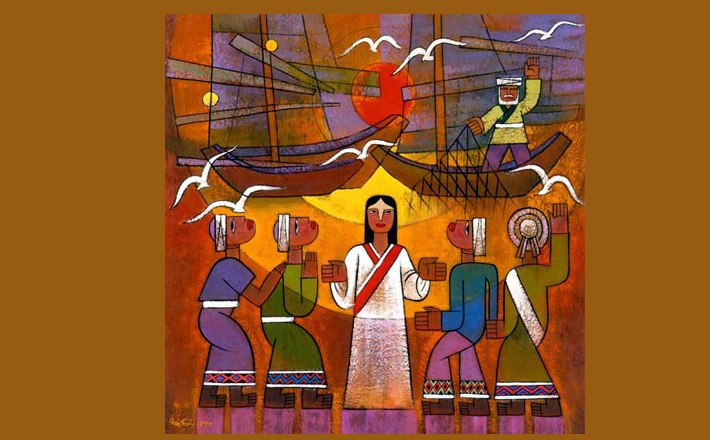Commentary on Matthew 4:12-23
Jesus’ ministry begins after his temptation, with the news of John’s arrest.
Although Matt 4:12 says that Jesus “withdrew” into Galilee, Jesus’ move was less a retreat and more a journey into the lion’s den. As Matthew will divulge later, the ruler of Galilee, Herod Antipas, was the one who had John arrested. John’s arrest foreshadows Jesus’ own.
Capernaum, where Jesus made his home, was a town of about 1,000 people. Its inhabitants relied on farming and fishing to survive. Though Jesus has already been named “Son of God,” he lives not among the rich and powerful, but among the common people. Capernaum was located on the northwest shore of the Sea of Galilee.
This region had historically belonged to the tribes of Zebulun and Naphtali, but in the first century it truly was “Galilee of the Gentiles” (4:15, quoting Isaiah 9:1), conquered by Rome and ruled by a Roman puppet whom few Jews regarded as authentically Jewish. Herod Antipas was notorious for his brutality and for his intolerance of any who threatened his claims to power. Into this context of danger and darkness and death comes Jesus, proclaiming deliverance and light and life.
Jesus’ message is identical to John’s: “Repent, for the kingdom of heaven has come near” (Matthew 4:17; cf. 3:2). Though the content is the same, the context is very different. John was the forerunner, who prepared the way. Jesus is the embodiment of the message. In his preaching and in his ministry, light has dawned and the reign of God has come.
Like John, Jesus calls people to repent. The Greek verb “repent” (metanoeo), like the Hebrew verb “repent” (shub), means “turn around.” Repentance in biblical thought involves not merely apology, but change: change direction, change your behavior, change your life.
The next two scenes illustrate how dramatically lives can change when Jesus appears. In the first scene Matthew depicts Jesus going out for a stroll by the lake and encountering two brothers, Simon Peter and Andrew, hard at work fishing. “Follow me,” he says, “and I will make you fish for people.” This first scene highlights Jesus’ call to a new life’s work. Without comments or questions, Peter and Andrew abandon the tools of their trade and follow him.
In the second scene Jesus sees another set of brothers, James and John the sons of Zebedee, in a boat with their father. Jesus calls them, too. This scene emphasizes the invitation to Jesus’ new community. James and John immediately leave both the boat and their father, who is mentioned three times in the passage. Jesus’ call takes priority over family commitments, a startling idea in an era when family connections were a primary source both of identity and of honor, and when the responsibility to care for one’s parents was rooted both in cultural custom and in biblical law.
Jesus calls his disciples to a new way of life in the reign of God. At its most basic, discipleship means following Jesus, getting behind him and going wherever he leads. For these first disciples it will be a difficult road, and despite their initial obedience to Jesus’ call, in the coming days they will often fail both to understand and to obey him. They will sleep through his agony in the garden of Gethsemane, they will flee when he is arrested, and Peter will deny that he even knows Jesus.
Yet, on the other side of their failure, Jesus’ message will reach them, entrusted by the angel at the tomb to the two Marys: “He has been raised from the dead, and indeed he is going ahead of you to Galilee; there you will see him” (Matthew 28:7). They will run away, but Jesus will not give up on them. He will call them to repent, to turn around and go back to the place where it all began. They will fail, but afterwards they will be called to follow once again. From these first scenes by the Sea of Galilee through the rest of their lives, Jesus calls his disciples to live out the promise and hope that he embodies.
In the final verse of today’s reading, Jesus himself begins to enact God’s reign. In his teaching, in his preaching, and in his ministry of healing, he announces and reveals God’s light dawning on a dark world, God’s rule triumphing over the powers of evil and death.


January 26, 2014